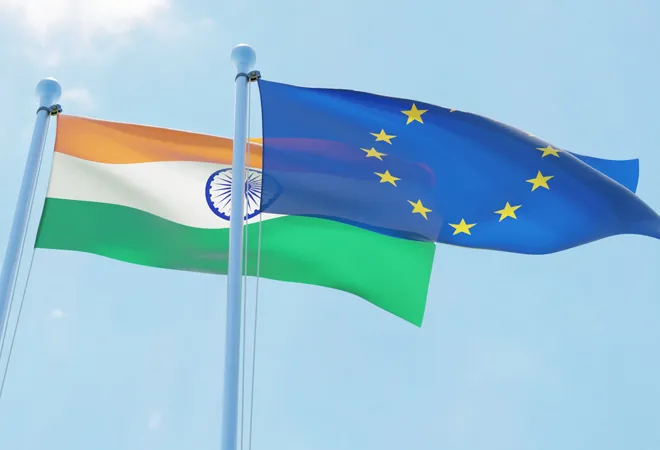-
CENTRES
Progammes & Centres
Location
India and the EU must explore new avenues for greater political and security cooperation to protect the world’s public goods

This piece is part of the series, India@75: Aspirations, Ambitions, and Approaches
Amongst the major poles of today’s unravelling international order, there is one relationship that is underperforming: That between India and Europe. Stronger India–Europe bonds will not only serve mutual interests, but also allow Delhi and Brussels to combine efforts in tackling global challenges, such as climate change, digitalisation, and the malfunctioning of international organisations.
There are various reasons for the previously lethargic state of bilateral relations. Since 1945, Europe has been preoccupied with itself. By widening and deepening the integration process, the European Union (EU) has stabilised the continent. Tethered to the United States (US), the transatlantic relationship has grown into the most tightly woven socioeconomic fabric between any two continents. With foreign affairs and security policy defined along national lines, Europe looks at the rest of the world mostly through the prism of this strategic alliance. The EU has exported its own diplomatic model of rules-based multilateralism to both member states and other nations, mostly in the field of trade. However, it has found it more difficult to develop such relations with states that are fiercely sovereigntist.
The EU has exported its own diplomatic model of rules-based multilateralism to both member states and other nations, mostly in the field of trade.
A subcontinent unto itself, India, too, has historically been consumed by domestic matters. Its traditional approach to Europe has been through its relations with individual countries rather than through the EU. However, India is now changing this posture, having realised that the European collective is its largest trade and investment partner, a key technological associate, and an increasingly important balancing actor in the Indian Ocean and the wider Middle East.
As a result of the forces of global reordering, there has been some improvement in the environment for more forthright and institutionalised security conversations (particularly in the maritime realm) and renewed bilateral trade negotiations that go beyond slashing sectoral tariffs. It is in these fields that India and the EU delivered on the expectation to breathe new life into their partnership at their virtual summit on 15 July 2020.
While Europe does entertain concerns about the hard Hindu-nationalist line of the second Modi government, the human rights dialogue that the parties agreed to reconvene will likely be drowned out in the increasingly pragmatic stance the EU has adopted to navigate the changing geopolitical landscape. Ironically, increased nationalism and realism may help renew multilateralism, since it is easier to negotiate between actors with clearly identified positions. A smaller EU must go beyond fraying alliances and forge new coalitions, seeking convergences with countries that have different historical trajectories. As an emerging power in a multipolar world, India too requires more—not less—multilateralism to secure a stable environment and sustain growth.
Increased nationalism and realism may help renew multilateralism, since it is easier to negotiate between actors with clearly identified positions.
Exacerbating the situation are two factors: That the United Nations is far less credible now than it has ever been in the 75 plus years since its conception, and that major powers have turned their backs on the World Trade Organisation (WTO) and other international organisations. The proliferation of exceptionalism is hollowing out the rules-based international order. While some of the challenges that the world is facing are new or more acute than before, the fundamentals of human behaviour remain the same: Greed, fear and the lust for power. If states let go of the multilateral system instead of upgrading it, they risk creating a world in which the weak will suffer at the hands of the strong. Multilateralism as a tool must be reformed, and there is work to be done by India and the EU.
The EU is on the front foot in designing global rules in new fields. It has initiated a global debate on rules to protect personal data; is aiming to set a global precedent for ethical, human-centric standards for the use of artificial intelligence; and is very active in the Organisation for Economic Co-operation and Development to renew its take on taxation in a digital world. Along with the US and Japan, the EU has agreed to new standards on industrial subsidies, in the hope of renewal within the WTO and binding China. Together with India, the world’s largest democracy, Europe can explore similar plurilateral arrangements to generate global opportunities in connectivity and new technologies.
India and the EU must explore new avenues for greater political and security cooperation to protect the world’s public goods.
Many of the problems that the world currently faces remain the same: From counterterrorism to maritime security; from state fragility to migration; from environmental degradation to public health. India and the EU must explore new avenues for greater political and security cooperation to protect the world’s public goods. In an era dominated by heightening Sino–US rivalry, there is a greater need for global burden-sharing between like-minded middle powers. India’s seat in the UN Security Council in 2021–22 and its Presidency of the G20 in 2022-2023 provide opportunities to move a joint vision into common action.
The views expressed above belong to the author(s). ORF research and analyses now available on Telegram! Click here to access our curated content — blogs, longforms and interviews.